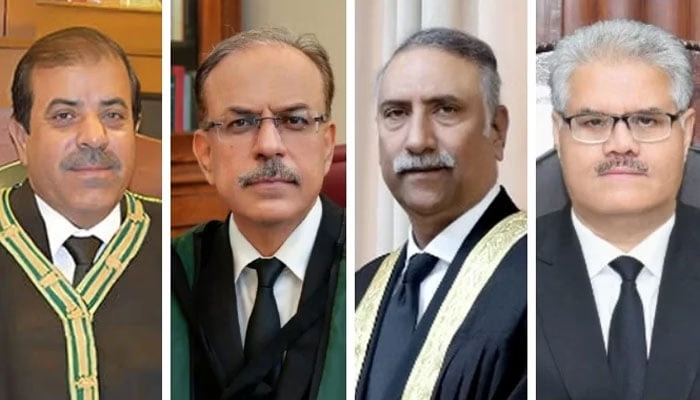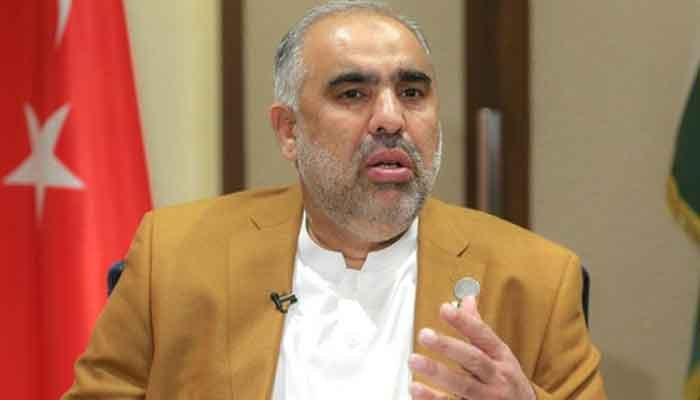ISLAMABAD: In a significant judicial development, the Ministry of Law and Justice has formally issued notifications confirming the permanent appointments of chief justices for all four high courts of Pakistan. The decision follows the approval of President Asif Ali Zardari, based on recommendations from the Judicial Commission of Pakistan (JCP), which had earlier nominated the judges for the top positions.
According to the notifications:
- Justice Sarfraz Dogar has been appointed as the Chief Justice of the Islamabad High Court (IHC).
- Justice Junaid Ghaffar will serve as the Chief Justice of the Sindh High Court.
- Justice Rozi Khan Bareech has been named the Chief Justice of the Balochistan High Court.
- Justice Atiq Shah has been appointed as the Chief Justice of the Peshawar High Court.
These appointments finalize the leadership structure of Pakistan’s four provincial high courts, ending months of interim arrangements and legal controversies, particularly surrounding the Islamabad High Court.
The case of Justice Sarfraz Dogar’s appointment to the IHC has been particularly contentious. Earlier this year, in February, five senior judges of the Islamabad High Court filed a petition in the Supreme Court of Pakistan, challenging both the appointment of Justice Dogar as the acting chief justice and the transfer of three judges from other high courts to the IHC. The petition was filed by Justice Mohsin Akhtar Kiyani, Justice Tariq Mehmood Jahangiri, Justice Babar Sattar, Justice Sardar Ejaz Ishaq Khan, and Justice Saman Riffat Imtiaz.
The five judges argued that the appointments and transfers were made without proper consultation and in violation of established judicial protocols. They expressed serious concerns about the implications of such administrative decisions on judicial independence and institutional integrity.
However, on June 19, the Supreme Court dismissed the petition, effectively allowing Justice Dogar to continue as the acting chief justice of the Islamabad High Court. The ruling, issued by the apex court’s Constitutional Bench, validated the process under which Justice Dogar had been appointed in an interim capacity.
Following the Supreme Court’s verdict, President Zardari moved to regularize the appointment, declaring Justice Sarfraz Dogar as the senior-most judge of the Islamabad High Court.This decision was backed by a revised seniority list issued by the Ministry of Law and Justice, further cementing Dogar’s eligibility for the role.
Nevertheless, the matter remains under judicial review. The five IHC judges who had originally challenged Justice Dogar’s appointment have now filed an intra-court appeal (ICA) against the Supreme Court’s June 19 decision. In their new plea, the judges have requested the court to recall and set aside the Constitutional Bench’s order, arguing that the decision should be reversed “in the interest of justice.”
The judges have also sought interim relief while the appeal is under review, requesting the court to halt any actions resulting from the earlier verdict until the new petition is heard and decided. Their petition further states:
“During the pendency of the instant appeal, this Hon’ble Court may graciously grant interim relief as prayed for in the accompanying interim relief application. Any other relief that this Hon’ble Court may deem fit and proper may also be granted.”
This ongoing legal battle has raised important constitutional and procedural questions about judicial appointments, transparency, and checks on executive power. While the permanent appointment of Justice Dogar is now official, the final outcome of the intra-court appeal may still impact how future judicial appointments are handled.
With the latest appointments, the leadership in Pakistan’s high courts is now in place, allowing the judiciary to function under permanent and stable leadership. The appointments are seen as a step toward restoring clarity and order after months of legal uncertainty.
As Pakistan continues to navigate complex constitutional and legal challenges, the roles of these newly appointed chief justices will be pivotal in shaping the future of the country’s judicial system.



